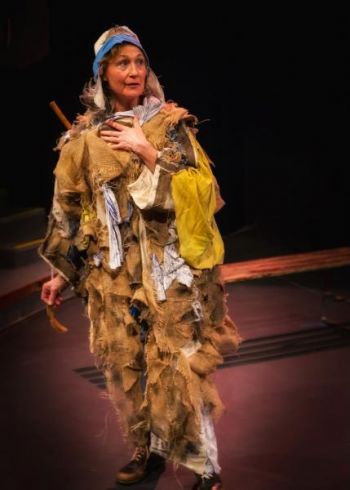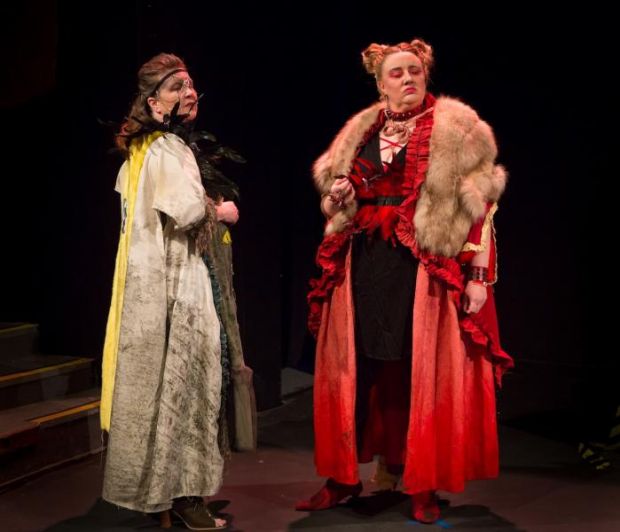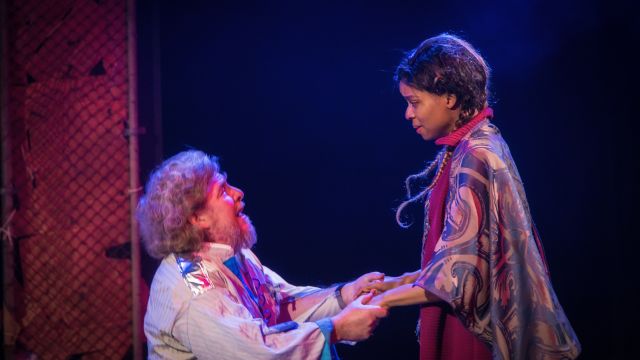King Lear
Shakespeare’s epic tragedy is reset to a post-apocalyptic world that has reverted to medieval power through monarchies, but this production from the University of Adelaide’s Theatre Guild retains the power, language and universal themes of its origins.
Beginning with the narcissistic Lear deciding how his kingdom should be passed onto his family, he rejects honesty in favour of flattery, offering half each to his two scheming daughters Goneril and Regan. Banishment is the reward for the third, Cordelia, whose respect, rather than love, for her father is stronger than her siblings’ hunger for power.
 Of course, once the kingdom has been divided up, the loyalty of his offspring evaporates, the former patriarch descends into madness, and with an opportunist inserting himself into the feuding family, the only certainty is death and tragedy – this is Shakespeare at its best.
Of course, once the kingdom has been divided up, the loyalty of his offspring evaporates, the former patriarch descends into madness, and with an opportunist inserting himself into the feuding family, the only certainty is death and tragedy – this is Shakespeare at its best.
Director Brant Eustice is no stranger to dark stories on the stage, having taken on two disturbing villains in the last ten months as Eric in David Ireland’s Cyprus Avenue (Red Phoenix, 2023) and Cohn in Angels in America (University of Adelaide Theatre Guild, 2024). This time, he intended to leave the performing to others, taking the director’s chair – but with one of his actors lost to ill health, he treads the boards here too, his assistant director Frederick Pincombe helping to guide the production to opening night.
The role of Lear is coveted by great actors everywhere, and for this production, Michael Eustice characterises him from self-pride to self-loathing. He starts strong, definitive in his insecurities expressed through angry words and petrifying stares – he knows when silence is enough. The realisation of betrayal is less confident, but once Lear’s memory and vision disconnect from reality, Eustice is brilliant again, the audience always in his grasp. He disgusts them with vileness, yet they’re soon sympathetic to his heartbreak, Lear’s tears not the only ones in the Little Theatre.
Kent (Sharon Malujlo) maintains the voice of reason even when this is seen as disloyal to her friend and King, and Malujlo, always brilliant on the stage, imbibes humility with every insult and degradation thrown her way, and her disguise for much of the story changes only the outward appearance – she ensures Kent’s thoughtfulness, kindness, and care are always there.

Brant Eustice steps into Gloucester and my goodness, how: he commands the stage – bending his knee (literally and figuratively) only when brother Eustice takes the stage. As a father manipulated, it is not through lack of intelligence; it is because he is blinded by emotion: love and rage taking it in turns to steer him. Gloucester’s fall is just as vital as Lear’s – and Brant ensures his tragedy is no less felt.
The old language is wonderful, but its meaning often takes a while to discern, which means clear diction and pace is paramount for the Bard’s work – especially for those unfamiliar with the story. The delivery of dialogue here does suffer at times from a lack of clarity, both in the shape and speed of the words, and their volume.
But no such problem with Sean Flierl, who plays Gloucester’s illegitimate son, Edmund. Flierl is masterful in voice and expression, devouring Shakespeare’s words and spitting them out with such wonderful passion that his whole body joins in. He is deliciously evil – are we allowed to be seduced by the bad guy? It certainly works with the women on stage, where Flierl is more sexual in his manipulation, though it’s still to grab as much power as he can.

The first ensemble scene introduces the main players in full court dress: Lisa Lanzi’s costumes are medieval Mad Max – the apparent regalness is, on closer inspection, contemporary, ancient, and scavenged – ripped fabric, towels and bag tags. They are stitched together in house colours and symbols, the blue crown, red snake, and green eyes defining the personality of the wearer. The incredible combinations of regal and rough expressing the desperation of trying to lift a person above the less-than-ordinary lives after the unnamed disaster that has befallen the planet. As with her designs in Red Phoenix’s The Trip to Bountiful earlier this year, Lanzi’s costumes are so much more than dressing for the actors – they are a vital component of telling this story. Anne-Louise Smith’s gravity-defying hairstyling also contributes greatly to these characterisations.
The two sisters Goneril (Georgia Stockham) and Regan (Rebecca Kemp) wear them well – and these fabulous dresses fit the personalities contained within. Stockham delivers her words with venom, keeping the right side of caricature, whilst Kemp smoulders with calculated expression, where we know there’s more behind her dialogue.
Once again, Shakespeare makes the light relief a true highlight, and Geoff Revell’s Fool is superb: he’s the only one who can barb the King and not be banished for it. But it’s not just the terrific delivery of his insults and truths wrapped up in jest, Revell’s physicality is marvellous: aided by mime-artist white gloves (though he’s rarely silent!), and adorned with a cock-comb cap, he bounces around the stage, interacting with the audience as well as any at London’s Globe Theatre.
Tracey Walker’s Albany is a tower of strength, and hers is a great performance to make a mark when surrounded by so many larger-than-life characters. There is not a bad performer in this cast: Robert Baulderstone is fabulous as Edgar, Gloucester’s wronged son – his soliloquy is heartfelt and powerful because it’s from mature sadness, not petulant anger; and Rhoda Sylvester’s Cordelia shows enough of her character to make you want to see more of her story.
And that’s part of the challenge in such a massive play as King Lear: how to tell the whole story whilst demonstrating its themes and their relevance to the audience. This production works well on the narrative, and the denouement is evidence enough of the folly of grabbing power at any cost, but behind those primal acts, where is the motivation? Why is Lear so insecure? Why do his daughters not love him? ‘What are you?’ says almost everyone in this play at one point, and we really want to know the answers.

Admittedly, these back-stories and contexts are easier to explore when you have more time – which Shakespeare doesn’t give you in these huge tales that don’t neatly fit for modern audiences who need a break every ninety minutes.
Though this production does put a massive amount onto the stage, and it’s well-supported by Kate Prescott’s simple and evocative set design and Richard Parkhill’s very effective lighting (which is a real achievement given the constraints on the ageing rig in this theatre). Michael Green’s music is suitably industrial, underscoring the action and signalling changes in pace and place, mixed seamlessly with Sean Smith’s excellent sound design – the noise of war filling the auditorium is just tremendous. And this production has the most exciting and brilliant combat scene I’ve seen on stage for a long time.
This is a tremendous production of King Lear from the Theatre Guild: the two Eustices and a brilliant cast and production team have achieved much here. ‘Where is thy lustre now?’ It’s on the Little Theatre stage until 25 August.
Review by Mark Wickett
(The reviewer is directing for the company later this year and is a member of their programming committee.)
Photographer: Richard Parkhill
Subscribe to our E-Newsletter, buy our latest print edition or find a Performing Arts book at Book Nook.

